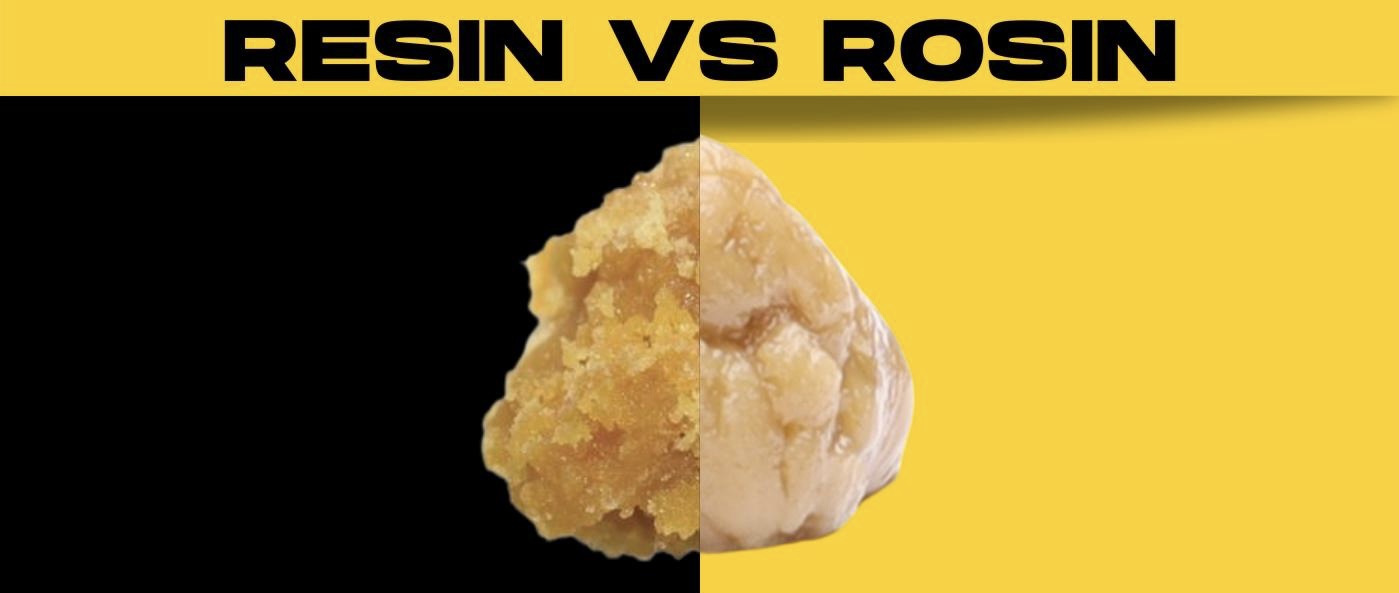We’ve said it before and we’ll say it again: the world of craft cannabis can be confusing, to say the least. Coupled with the creative marketing terminology that brands use to set their products apart from the competition, it can be unnecessarily confusing to shop for that perfect strain to keep you creatively inspired throughout the day or lull you into a deep sleep before bed.
But we’re here to help.
As you surf through our highly curated menu, chances are that you’ll see the terms resin and rosin. At first glance, you may think you’ve stumbled across a typo, but resin and rosin are actually two entirely different compounds. Let’s get into resin vs. rosin!
Resin vs. Rosin
As we mentioned, the terms are so similar that it’s easy to get lost in a dispensary menu, let alone a conversation between two cannabis connoisseurs. To kick this info session off, it’s important to highlight their similarities before diving into their differences; however, if we’re being entirely honest, their only real similarity is that they’re both concentrates. And now with that out of the way, we can get into the point of this entire blog post: To share everything we know about the differences between the two.
Simply put, resin is what budtenders often refer to as the hydrocarbon-extracted concentrates found in dispensaries; however, it’s also a name for the sticky compound of trichomes and terpenes found on the leaves of the actual cannabis flowers.
Now if you’re an OG stoner from back in the day, you may know resin as the black buildup you commonly find in your pipes and bongs. You might have found yourself scraping some resin off the sides of your bong to smoke on its own; however, hopefully you’re no longer doing that and instead just place a fresh order on hyperwolf.com — but that’s beside the point.
On the other hand, rosin is a potent concentrate that’s created by using heat and pressure or mechanical methods to separate the trichomes from the plant material. From there, the trichomes are tightly compacted and leave behind a milky white or orange material that can be consumed.
Live vs. Cured
You’ll often come across terms such as ‘live’ and ‘cured’ while surfing through our menu. These terms give you an idea about the starting material used before the extraction process even takes place. In other words, referring to a concentrate as ‘live’ simply means that living flower was used, whereas ‘cured’ means that dried flower was used.
Live Resin: The process to create the live resin concentrates we all know and love begins by harvesting the still-living plants and flash freezing them before they even have the chance to decompose or dry. From there, the trichomes are extracted using solvents to create the finished concentrate.
Live resin produces a more flavorful concentrate since the terpenes are protected from damage or destruction before, during, and after the extraction process.
Cured Resin: The process to create cured resin concentrates is the same as live resin, utilizing a hydrocarbon extraction process; however, the only difference is that the starter material is dried cannabis flowers versus still-living plants. From there, heat, pressure, and chemical compounds, such as butane or propane, work together to extract the concentrate material, leaving behind a sticky, more liquidy ‘terpene sauce’ as well as a few THCa diamonds.
Live Rosin: And finally… we’ve reached live rosin. Rosin is most often regarded as a ‘natural alternative’ to resin because it doesn’t require chemicals, or solvents, in its extraction process. It begins with living plant matter to start, which means that the final concentrate is more potent and flavorful than standard rosin.
Which Variation is Better?
It all comes down to preference…
Those who swear by rosin typically prefer its natural qualities, fresh terpenes, targeted extraction process, and protection from any damages that can dilute the plant’s natural restorative chemical compounds that all play into the ‘entourage effect,’ which is the positive physiological effect that cannabis has on our bodies. However, live resin generally contains more THC, and is therefore more potent.
Given that we’re in no position to sway your preferences, we personally consume both resin and rosin, and feature all variations on our menu.
In the end, we hope that you take this research into consideration the next time you’re browsing our menu to help you pick out your perfect concentrate.

 Rewards
Rewards




